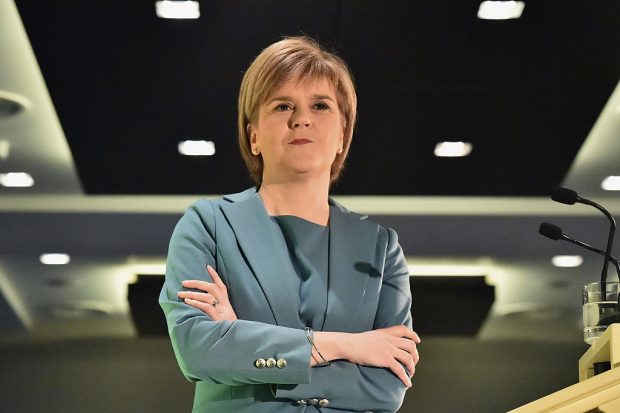Nicola Sturgeon is in a bit of a fix. After saying that the Scottish independence referendum was a once-in-a-generation event she is calling for a second one just two years after the first. But polls show Scots have no appetite for this vote. Unlike the SNP activist base, which is itching for another fight – and there have even been signs of a Momentum-style infiltration of the SNP, raising the prospect of a split in a party whose strength has (hitherto) been in its discipline. So what’s the First Minister to do?
Her answer, in the SNP conference, is to assuage the activists and publish a new referendum bill. Her peg is the Brexit vote, and her shtick is simple. She airbrushes out the two-in-five Scots who voted for Brexit, and pretends that the whole of Scotland is appalled by what’s happening. Like a Catholic seeking an ‘annulment’ of a marriage, she’s saying the 2014 referendum result has been voided because it was based on a false premise. That ‘the UK we voted to stay a part of in 2014 is not the UK we now face the prospect of’.
As ever with the SNP, the game is to set a test that the UK Government will fail. In her case, it’s the fantasy that Brexit will mean that Britain stays within the EU customs block. As she put it:-
‘I want Scotland to stay in the single market, I want Scotland to stay in the European Union. but what is absolutely vital for our economy is that we’re not taken out of the single market. the impact of that on jobs, trade, investment would be severe and i don’t want to see Scotland’s economy suffer in that way.’
If she thinks leaving the EU would make Scotland’s economy suffer, what’s her analysis of the impact of leaving the union of the UK? She didn’t say today, but she didn’t have to. Just a few weeks ago, her officials released the national accounts which show that, no matter how much you divide the oil, a separate Scotland would have the largest deficit in the Western world. It’s implausible for a new country to debut with basket case finances. As we argued in a leader a few weeks ago, independence for Scotland would mean sado-austerity for Scotland. Most of those at the SNP conference may think this a price worth paying, but it’s harder to deny the price.
The SNP government’s own figures make clear that the economic benefits of the Union far outweigh those of the EU. And while the Brexit vote did send a spike in support for secession, it has since died down when the impact of the North Sea Oil crash sank in. It’s still hovering at around 45 per cent – as Sturgeon knows, it would have to be at about 60 per cent for her to risk another referendum. If she loses a second one, as the Quebec secessionists did, then it’s game over. Sturgeon would end up as the leader that buried Scottish independence movement.
A similar number of Scots (46 per cent) are against the prospect of even holding another referendum in the next couple of years. Sturgeon was asked about this, but did her best to dodge the question:
‘I’m the first minister of Scotland, I’ve got a duty to tell people straight what I think has to be done to protect out interests. its up to people whether they agree with me or not. If Scotland is in the position against our democratic wishes of being taken out not just of the EU but of the single market, knowing that is going to seriously damage our economy, then I think I would have a duty to give Scotland the ability to decide whether it wanted that or whether it wanted to take a different path.’
For all the fighting talk and drumming up fears about a hard Brexit, Sturgeon’s big problem is that Scots don’t want a second vote – something that her ever-more-restive activists are reluctant to accept. With the fight for the party’s deputy leadership looking set to revive the old ‘fundamentalists’ vs ‘pragmatists’ divide that used to split the party in the pre-devolution days, things look set to get far trickier for the First Minister.







Comments